Awards and honours
© Heinz Eifert, Marburg/Max Frisch Archive, Zurich
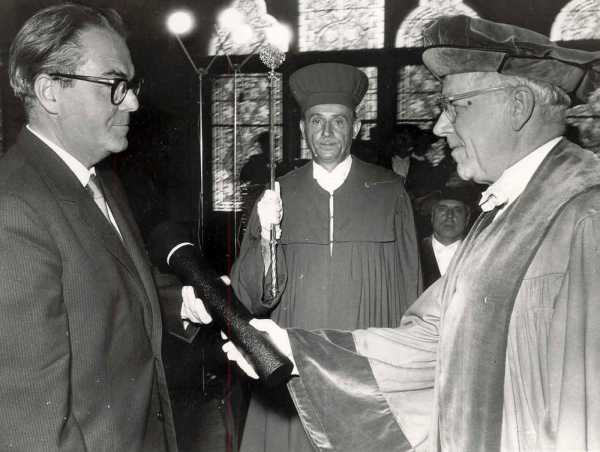 In 1974 Max Frisch was made an honorary member of the American Academy of Arts and Letters and the National Institute of Arts and Letters
In 1974 Max Frisch was made an honorary member of the American Academy of Arts and Letters and the National Institute of Arts and Letters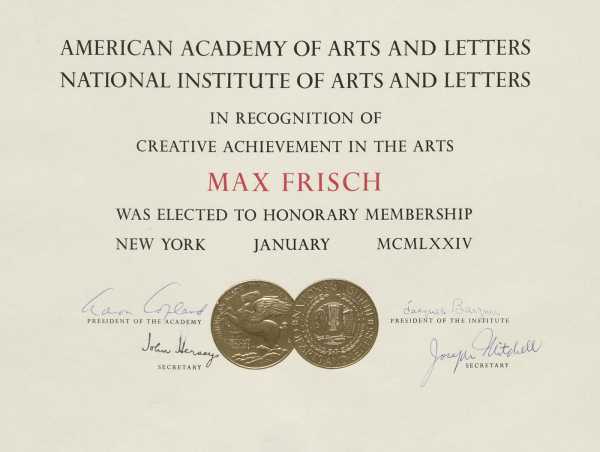 During the awards ceremony for the Peace Prize of the German Book Trade in Paulskirche, Frankfurt, 1976. © Max Frisch Archive, Zurich
During the awards ceremony for the Peace Prize of the German Book Trade in Paulskirche, Frankfurt, 1976. © Max Frisch Archive, Zurich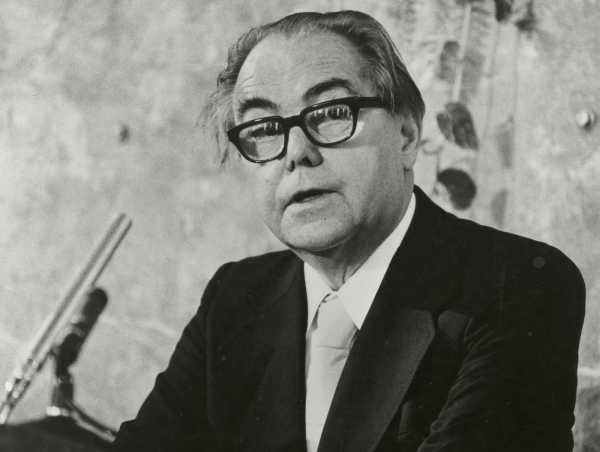 Max Frisch donated the prize money he received for the Neustadt International Prize for Literature in 1986 for the construction of a school in Nicaragua. © Max Frisch Archive, Zurich
Max Frisch donated the prize money he received for the Neustadt International Prize for Literature in 1986 for the construction of a school in Nicaragua. © Max Frisch Archive, Zurich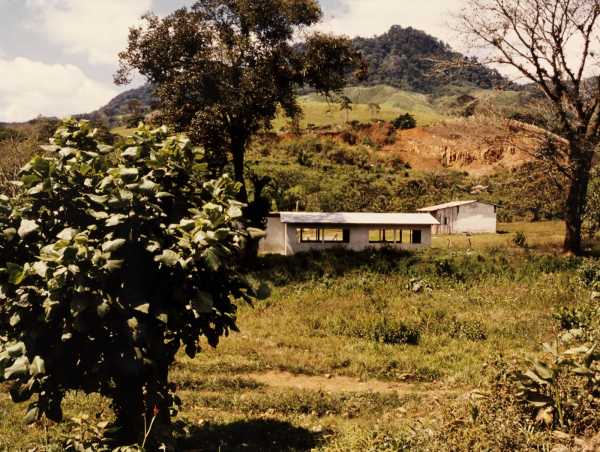 In 1989 Max Frisch received the Heinrich Heine Prize from the City of Düsseldorf
In 1989 Max Frisch received the Heinrich Heine Prize from the City of Düsseldorf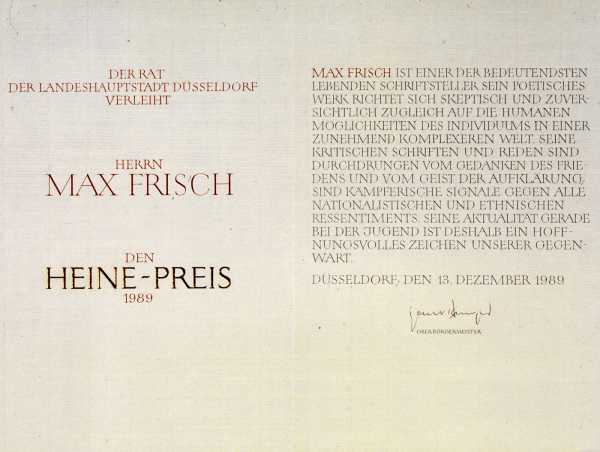
1945
Preis der Welti-Stiftung für das Drama
In 1945 Bern City Council awarded its Prize for Drama to Max Frisch's dramatic debut "Santa Cruz". The award, which carried CHF 3,000 in prize money, was already presented to the author before the play actually opened. Frisch expressed how much the award meant to him in a letter to Bern's Department of Finance: "I am just as delighted with the accolade that my dramatic debut has received as with the prize money itself, which helps me assert the author against the architect every day, who otherwise always has to support that very author."
1955
Schleussner-Schüller-Preis des Hessischen Rundfunks
In 1954 Max Frisch was commissioned by the Hessian Broadcasting Corporation to write the radio play "Der Laie und die Architektur", for which the broadcasting centre awarded him the Schleussner-Schüller-Preis and 3,000 deutschmarks in prize money.
Wilhelm-Raabe-Preis
In 1955 Max Frisch was awarded the Wilhelm-Raabe-Preis by the City of Brunswick. According to the rules, the winning piece had to bear a relationship to the present and be on a par with the work of the accolade’s namesake, Wilhelm Raabe. The judging panel felt that Frisch's novel "Stiller" (I'm Not Stiller, 1962) more than met these criteria.
1958
Georg-Büchner Prize
Max Frisch was the first foreign author to win the Georg Büchner Prize (prize money: 5,000 deutschmarks), which was presented to him in Büchner's birthplace, Darmstadt. The judging panel felt that Frisch was an author who "roots out the tension in the people of our time and, in the search for new, valid values, portrays its significance with artistic truthfulness". Max Frisch gave a highly regarded acceptance speech entitled "Emigranten".
Literaturpreis der Stadt Zürich
In 1958 Max Frisch received the Literaturpreis der Stadt Zürich, which carried CHF 8,000 in prize money. The certificate which his home town presented to him stated that his work constituted a "critique and self-criticism of modern existence". In his acceptance speech, "Öffentlichkeit als Partner", Frisch asked about the role of the author in public life.
Prix Charles Veillon
The same year, Max Frisch received the prestigious Prix Charles Veillon for his novels "Homo faber" (Homo Faber, 1959) and "Stiller" (I’m not Stiller, 1962) in Lugano. The accolade, which is awarded to a German, Italian or French-speaking author, carried CHF 5,000 in prize money.
1962
Honorary Doctorate from the University of Marburg
Max Frisch received the first of four honorary doctorates from the Faculty of Philosophy at the University of Marburg in 1962. The certificate referred to the tradition of classical, romantic literature, into which Frisch had created "new, vivid and contemporary avenues". On the eve of the award ceremony, he gave a talk on his own poetology and his novel "Mein Name sei Gantenbein" (A Wilderness of Mirrors, 1965), which he was writing at the time.
Grosser Kulturpreis des Landes Nordrhein-Westfalen
In 1962 Max Frisch was awarded the Grosser Kulturpreis by the German state of North Rhine-Westphalia, which carried 10,000 deutschmarks in prize money. Minister-President Franz Meyers presented him with the certificate in the state capital, Düsseldorf. Frisch donated the prize money to Spanish artists who had been persecuted by the fascist Franco regime. The gesture was also intended as a criticism of Switzerland's "neutral" stance towards Franco's dictatorship.
Preis der jungen Generation
In 1962 the newspaper "Die Welt" (Berlin) awarded its inaugural Preis der jungen Generation to Max Frisch for his play "Andorra" and publicist Hans Walter Bähr for his document collection "Die Stimme des Menschen". The judges deemed both works especially valuable to the younger generation, even though they were not explicitly books for young people. The following year, "Die Welt" held an essay competition for young people in addition to awarding the prize. The top 100 essays on the topic of "Are 'Andorra' and 'Die Stimme des Menschen' books that have something to say to the young generation?" were awarded prizes by a judging panel, which included Tübingen German scholar Walter Jens.
1965
Jerusalem Prize for the Freedom of the Individual in Society
In 1965 Max Frisch received the Jerusalem Prize for the Freedom of the Individual in Society, along with USD 2,000 in prize money. Being Israel's only international book prize, the award is still presented every two years at the International Book Fair in Jerusalem. The jury lauded Frisch's "true-to-life and incisive descriptions of the human desire for freedom – both as individuals and members of society". Frisch's brief speech was the first to be given in German at an official occasion in Israel. Before the awards ceremony, Frisch had spent a week travelling around the country. He saw in Israel "the country, the event that fills us with confidence in the future of mankind like no other"; in Israel, he felt, there was still a belief in the future that harboured a "creative force".
Schiller-Gedächtnispreis des Landes Baden-Württemberg
Besides the Jerusalem Prize for the Freedom of the Individual in Society, Max Frisch was also awarded the Schiller-Gedächtnispreis by the German state of Baden-Württemberg in 1965. The award was founded in 1955 to commemorate the 150th anniversary of Friedrich Schiller's death and carried 15,000 deutschmarks in prize money the year Frisch won.
1974
Grand Prize of the Swiss Schiller Foundation
After receiving the Schiller Memorial Prize from the German state of Baden-Württemberg in 1965, Max Frisch was also awarded the Grand Prize of the Swiss Schiller Foundation on 12 January 1974, which carried CHF 20,000 in prize money. "What is home?" was the question that Frisch addressed in his acceptance speech. "Dear fellow countrymen," he began: "I was born in Helios-Strasse…" He then went on to talk about what home meant to him via topics such as neighbourhoods, landscapes, language and politics.
Honorary Member of the American Academy of Arts and Letters and the National Institute of Arts and Letters
In 1974 Max Frisch was made an honorary member of the American Academy of Arts and Letters and the National Institute of Arts and Letters. Founded in New York in 1899, the two sister institutions have set themselves the goal of promoting interest in literature, the fine arts and music by presenting prizes and awards. Frisch's American publisher, Helen Wolff, organised a reading tour in the run-up to the awards ceremony. Frisch then spent a weekend with the young publishing assistant Alice Locke-Carey in Montauk, a small town on the eastern tip of Long Island. The sojourn inspired his autobiographically rooted story "Montauk", which was published the following year.
1976
Peace Prize of the German Book Trade
In 1976 Max Frisch was awarded the Peace Prize in Frankfurt am Main. The German Publishers and Booksellers Association thereby honoured an author who never tired of "holding up a mirror to us in which we are shocked and affected to recognise our ability to maintain and cement peace in individuals and groups". In his acceptance speech "Wir hoffen", he addressed the question as to what makes a peaceable society, concluding that, "A society capable of peace would be one that can do without enemy images."
1980
Honorary doctorate from Bard College Annandale-on-Hudson
In 1980 Bard College in Annandale-on-Hudson in the US state of New York made Max Frisch an honorary Doctor of Letters because his work was deemed a powerful portrayal of the crisis of modern man. Frisch commented drily in a letter to the publisher and author Otto F. Walter: "An American university dressed me in a gown: ALL YOU NEED IS HONOR…"
1982
Honorary doctorate from the City University of New York
In 1982 Max Frisch received his third honorary doctorate from City University of New York. The certificate stressed his social commitment as an author: "You exemplify for us the artist as a citizen of the world." Shortly after the ceremony, Frisch took part in one of the largest demonstrations in the history of New York: hundreds of thousands of people had gathered to demonstrate peacefully against nuclear weapons and the arms race during the Cold War.
1984
Commander of the Order of Arts and Letters
In 1984 Max Frisch was elected as a Commander of the Order of Arts and Letters. This prestigious award has been presented by the French Ministry of Culture since 1957 to individuals who "have distinguished themselves through their work in the field of art or literature or contributed to the spread of the arts and literature in France and beyond". Frisch had a close relationship with French culture and politics at the time. In December 1981, he was a guest of the then French President François Mitterrand and Culture Minister Jack Lang.
Honorary Fellow of the Modern Language Association
The Modern Language Association of America (MLA) is the most important professional organisation of literary scholars and linguists in the USA. Max Frisch was made an honorary member in 1984.
1985
Common Wealth Award of Distinguished Service in Literature
In 1985 Max Frisch received the Common Wealth Award of Distinguished Service in Literature from the Modern Language Association in Chicago. The award, which carried USD 16,000 in prize money, is still presented annually to people who have made outstanding contributions in their respective fields.
Foreign Honorary Member of the American Academy of Arts and Sciences
In 1985 Max Frisch was made a Foreign Honorary Member of the American Academy of Arts and Sciences. Founded in 1780 during the American Revolutionary War, it is one of the oldest scholarly societies in the country.
1986
Neustadt International Prize for Literature
In 1986 Max Frisch became the first German-speaking author to be awarded the Neustadt International Prize for Literature by the University of Oklahoma and the literary journal "World Literature Today". With USD 25,000 in prize money, it is the only US-American literature prize to be awarded internationally. It is also dubbed the "American Nobel". After the presentation of the certificate, Frisch caused quite a stir with his acceptance speech "USA Collage". He used old texts such as the "Tagebücher", "Montauk" and more recent notes to paint a kaleidoscopic picture of his perception of the USA with "scissors and glue". In the speech, Frisch voiced major criticism of American politics, especially its interventions in Latin America in the late 1980s. Frisch had not intended his comments to be understood as in any way anti-Americanism: "My criticism only concerns politics whenever it becomes inhumane." He received extensive praise for his decision to donate the prize money for the construction of a village school in Nicaragua.
1987
Honorary Doctorate from the Technical University of Berlin
As an author and qualified architect, Max Frisch embodied the Technical University of Berlin's goal of combining an education in technical and natural sciences with the humanities and social sciences. In his laudatory speech, Walter Höllerer, the founder of the journal "Sprache im technischen Zeitalter" (Spritz), drew no distinction between Frisch's ideals as a writer and as an architect: in both instances, he pursued the "construction of new guiding principles that withstand the conditions of the era". In the tradition of his famous questionnaires from "Tagebuch 1966–1971", Frisch raised 25 questions on technology, ethics, economics and science in his acceptance speech, including the following: "Do you believe in a scholars' republic?"
1989
Heinrich Heine Prize of the City of Düsseldorf
On 13 December 1989, Heinrich Heine's 192nd birthday, the author's home town of Düsseldorf presented Max Frisch with the Heinrich Heine Prize and 25,000 deutschmarks in prize money. The city fathers felt that Frisch was one of most important living authors whose work was imbued with the idea of peace and the spirit of enlightenment. In the year in which Frisch received the accolade, the award took on an unexpected political dimension. Just one month previously, the Berlin Wall had come down. In his speech entitled "Wir sind das Volk", Frisch referred to the events directly. The author donated the prize money to the GSoA (Group for a Switzerland without an Army) for a poster campaign.